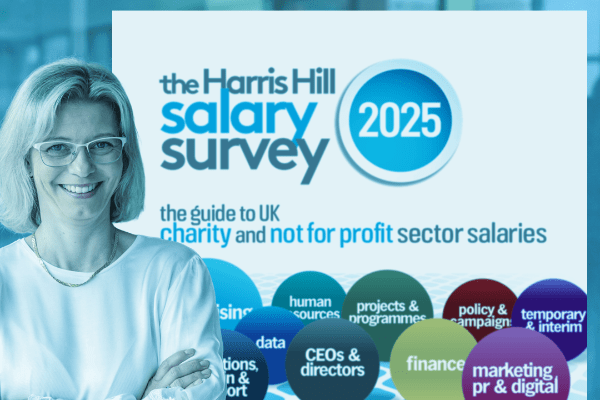
It’s the big day and even your butterflies are nervous. You don’t get many chances so you can’t afford to mess this one up; you’ve got to make them see you’re ideal. But what if they still accept another offer?
Yes, interview nerves aren’t just for applicants any more. The battle for talent means employers can’t always assume the upper hand, particularly in areas like fundraising where candidates may have multiple offers, so charities really need to make the right impression.
But while interview tips for job-seekers are everywhere, what if you’re asking the questions?
We asked the internet but it basically shrugged, pretended not to hear and tried distracting us with videos of (adorable) snowboarding dogs - so in this guide started some hours later, we’ll share some of the things we've learned from almost 30 years of organising, conducting or participating in charity sector interviews.

Part 1: planning ahead
Success, as any number of insufferable LinkedIn posts will tell you, is all in the planning. So before we tackle the questions, some interview preparation: why it’s essential for employers and how to set yourself up for a successful outcome. Starting with a very simple question…
What’s the point of interviews?
Judging by just about every portrayal of an interview in everything ever made, they’re the all-powerful employer’s opportunity to grill potential candidates and decide who to hire. Will our plucky protagonist get the job? Who will get through? Dramatic music and unnecessarily long pauses!
However the perspective we rarely see is that they’re also a chance for candidates to evaluate employers and decide where they want to work.

So what makes candidates want to work for you?
Their opinion of you as an employer, otherwise known as your employer brand.
And what - according to research by corporate recruitment giant Robert Walters and Third Sector’s Employer Branding Insights report from a few years ago - has the greatest impact on those opinions? Interviews, of course.
In the Robert Walters study, albeit conducted overseas, 97% of candidates cited interviews as ‘important’ or ‘extremely important’ in shaping their opinion of employers, while here in the Third Sector the number one factor, cited by 81.9%, was ‘the impression left by interviewers’.
Third Sector’s report also revealed that no less than 89% of candidates would turn down a job based on a bad interview experience, which is why they're not the only ones who need to impress at interviews. In a close-knit sector where people love to talk, getting it wrong can quickly damage your employer brand, making it harder to attract quality candidates, thereby affecting your organisation and by extension, potentially even your own career.

It’s a good thing managers are trained before they start interviewing then – aren’t they?
Well, yes and no. But mainly no, according to CIPD research which found that only 28% of UK employers consistently provide such training, while a 2018 study by science and technology specialists Hyper Recruitment Solutions found that 47% of hiring managers had never received relevant training, rising to 64% of those with recently-acquired interviewing responsibilities.
For charities, rarely burdened with tech-industry training budgets, the picture may be even worse. We’d better get on with those tips….

1. Choose your interviewers wisely
Two of them ideally, one being the immediate line manager, while the other might be their manager, the head of department or HR.
However, job title matters far less than their knowledge of the post you want to fill. Someone who’s previously worked in the role, for example, will likely be a better advocate for the job and better able to judge someone’s suitability than a more distant senior figure - however their strength will be in advocating for the organisation, bringing the big-picture perspective to its ambitions, values, impact and future direction.
Having interviewers who each bring something different to the table is helpful, but doesn't require the whole ‘good cop/bad cop’ routine, however much you might like the uniform.
Changing things up for the second round can add fresh perspectives and stop it feeling like a re-run of the first, and if you’re meeting in person, why not arrange a few informal chats with other team members too? It's an approach we can vouch for ourselves that gives us the benefit of more opinions, while candidates get a better feel for the workplace and whether it’s right for them.

2. Set a smart schedule…
The overall aim should be to keep the process as short as possible - dragging it out increases the risk of losing top candidates to faster-moving employers – but for a level playing field, all candidates should meet the same panel.
One solution could be to hold all interviews on the same day, but be realistic about what’s achievable. Seeing three candidates might be fine, but schedule six back-to-back sessions and it’s almost inevitable that you’ll be interrupted, end up running late, and after six rounds of the same conversation, thoroughly confused about who said what.
To save everyone from potential disadvantage, set a schedule where you’ll be similarly fresh (or at least equally exhausted) for all of them.

3 …and stick to it
Once the arrangements are circulated, consider them set in stone.
Come hell or high water – and both seem increasingly likely - they’re not to be shunted around, since candidates may have gone to great lengths for time off to attend. Those working from home may have more flexibility, but if they’re office-based, beginning or end-of-day timeslots are preferable, simply because it’s easier to invent a reason to arrive late/leave early than to disappear mid-morning, looking curiously smart…
And while you might be able to reschedule at a moment’s notice, remember it could be far trickier for your interviewee. It’s already the fourth time their grandmother’s been buried, and now it’s been bumped to next Tuesday?

4. Know the rules (and when to bend them)
It might not always feel like it, but policies are generally intended to help you, so if they’re actually holding you back it’s worth finding out if exceptions can be made.
For example, two-stage interviews might be your organisation’s standard procedure, but are they truly essential for the junior vacancy you’re trying to fill? If second interviews only confirm your first impressions, there’s a fair argument for skipping them entirely.
Or what if you happen to find the perfect candidate who’s eager to join, but for balance, you’re obliged to see at least three? Do you break the rules to snap them up, or keep them hanging while you try to find two more? There’s a risk of losing your first choice in that time (as has happened to clients of ours), and is it fair to those who are only making up the numbers?
You can’t plan for every eventuality, but you can get to know your organisation’s recruitment policies, identify any likely obstacles, and address them with the relevant people before you get there. They may even know a good way around them.
Now you’ve got the perfect panel in place, commitment to an achievable, candidate-friendly schedule, and potential roadblocks cleared from the way ahead, you’re ready to start asking some questions. Which is what we’ll discuss in part 2.
| |

t
| |
t
-

Opportunity for all
Find out how we’re working to deliver more diverse, equitable and inclusive recruitment…
-

Recruiting a charity CEO?
Our executive recruitment specialists have an exceptional record of successful CEO, chair, trustee and…
-

Charity sector salaries
Our 2025 Salary Survey has the latest rates and expert insight for roles throughout the sector.













